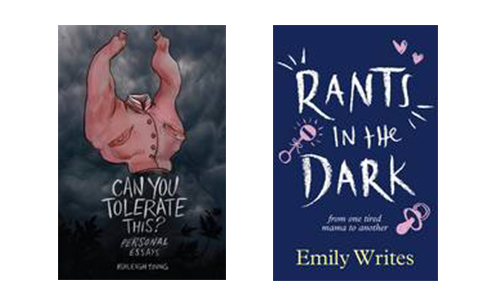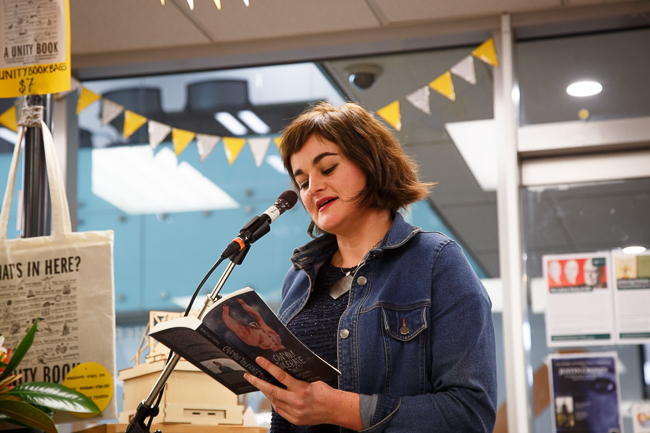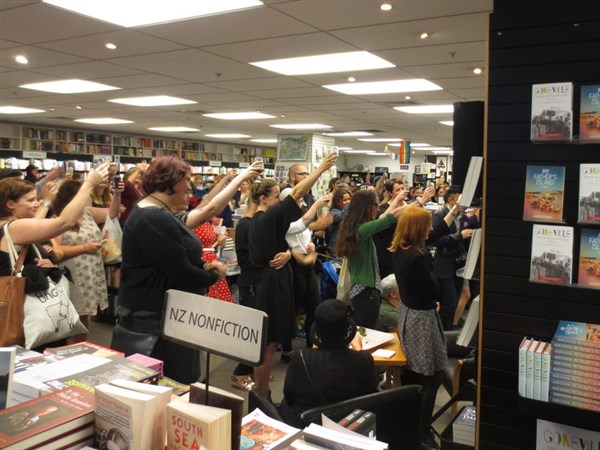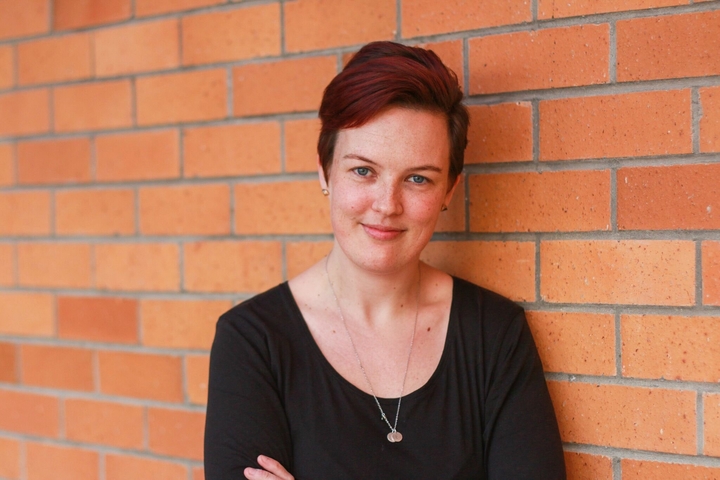3:00 PM, 6 April 2017
The publishing of blogs in book form is not a new phenomenon. Internationally every year hundreds of blogs, ranging from recipe, to humour, to comics, to personal are converted and published into books. But the recent successes of Emily Writes’ Rants in the Dark, and Ashleigh Young’s Can You Tolerate This?, two books with connections to blogs (emilywrites.co.nz and eyelashroaming.com respectively) sparked us to investigate the blog/book relationship in New Zealand.
The Read spoke to these two authors, their publishers Margaret Sinclair from Penguin Random House and Fergus Barrowman from Victoria University Press, and bookseller Marcus Greville from Unity Wellington – where both titles were launched – about how the writers’ respective blogs influenced the writing, publishing and sales of their titles.

How to know what works?
First off, we wanted to know how a publisher would know when a blog has potential to be published as a book, and when it’s better left to the web. We put this question to Margaret Sinclair of Penguin and she said: “The topics being written about are crucial first of all, then the blogger’s engagement with their followers. If there isn’t much engagement, then it’s probably best left where it is.”
In Emily Writes’ case it was an obvious choice, “The blog was consistently getting a lot of traffic,” Writes says. “It was always in the top five blogs in New Zealand despite not publishing posts very often. I also had a lot of feedback from readers saying they were printing out blogs and giving them to friends as baby shower presents –they often said 'It would be so much better if it was a book’”.
Negotiating the form
After being approached by Penguin, Writes and her publisher had to decide the form that the book would take. How much would come from the blog, and how much would be new exclusive content to the book. We asked Sinclair what Penguin Random House’s expectation is. She says, “We would expect to offer something new to readers, even if we also repeat their favourite previously published pieces. With Emily, for example, her fans would have felt let down if we had not included her most popular pieces – and people coming to her for the first time might have missed them entirely.”
Writes says of the process, “Margaret and I talked through ideas and eventually decided on an approach that was ‘If it ain't broke don't fix it’.” And although more than half the content in the book is new, it was based on a formula made successful established by the blog. “The book is based around that first blog post because that resonated so strongly with readers all around the world.”
Blogging as development
Unlike Writes’, Ashleigh Young’s blog collection Can You Tolerate This? was not commissioned off the back of her blog Eyelash Roaming – instead, the blog provided a place to hone her craft, as well as providing roughly a quarter of the essays that made up the collection. Young’s publisher Fergus Barrowman of Victoria University Publishing says, “What blogging gave her, I believe, was an outlet for writing without meeting the needs or proprieties of an editor or publisher, and to develop her wonderfully immediate and intimate style.”

Young says of blogging: “It probably did change the way I write – in that practising anything helps you get better. It made me feel that I might have something to say, in my own deeply flawed way. It helped me worry less about getting every sentence absolutely right. My blog didn't really affect how I felt about the earlier essays I'd written – but I certainly felt less precious about them, and I realised they weren't cast in stone. I could mess about with them, and did.”
Immediacy as a positive?
Both Young and Writes acknowledge the impact of the immediacy of blogging as a positive impact on their writing.
Writes says, “You just can't get that raw, unfiltered truth when you're looking back. Re-reading old posts I really understood that – I couldn't even recognise myself. If I'd re-written them – I would have softened the edges, been more forgiving. That's the nature of it.“

Young says, “I did a little bit of editing and 'honing' (i.e. deleting and retyping the same sentence at least nine times). But there was something in the blog posts I wanted to hold on to, too – the ramshackle haste of them, that sense of coming out of a particular moment.”
But Sinclair cautioned of the immediacy of blogging as a potential negative for bloggers looking to get published: “Bloggers’ work is usually topical and time sensitive and wouldn’t translate into the longer timeframes and more permanent nature of books.”
Established audience
One major benefit of publishing bloggers is tapping into their established audience. Rants in the Dark went straight to the top of the New Zealand Non-fiction Nielsen Weekly Bestseller chart upon launch, and has stayed in the charts since. Writes says, “I definitely think my blog readers are the reason why the book has sold out in so many locations. I was astounded that people bought two, three, even ten copies at book signings.”
From a publisher’s perspective, Sinclair says: “You can see their writing and how people do or don’t relate to it. It’s like having a ready-made focus group. It also offers publishers the chance to reach a new audience who may not have been book-buyers previously.”
As for Can You Tolerate This? Barrowman and Young are a lot less inclined to credit blogging as the reason for success, it was simply one of many reasons. Barrowman says, “Blogging helped prepare the ground for Can You Tolerate This? with a sympathetic network of readers and other writers. But it wasn't unique in this; other social media, writing for publication, friendships all played a part. Impossible to unpick.”
And Marcus Greville from Unity Books Wellington sees blogging as one of the many paths to an audience, “Each book and author generate interest that is quite unique to them and their work. The numbers of attendees [at the launch] emphasises the differences very strongly – so the large number of women at Emily Writes’ launch for Rants in the Dark was very noticeable, but only as much as the number of journalists at our recent launch for Nicky Hager, or writers at last year’s launch of Ashleigh Young’s Can You Tolerate This.”

Greville also talks with the experience of launching previous books with blogging connections, such as Simon Sweetman’s On Song, and Laura Vincent’s Hungry and Frozen and their long-term impact,“Like most books, the bulk of the sales were within a few months of publication. Certainly people come in seeking that particular book, searching them out from their online experience or review coverage. I would be curious to know how much the blog readership of those authors increased after the publications of their books, as I suspect that would be the more dramatic influence.”
The future for the blog/book relationship
As for the future of books and blogs, it seems apart from the occasional successes of the likes of Writes and Young, the relationship is dwindling. Greville says, “I think it takes an exceptional blog to make it into book form these days; sites such as tumblr, and more cooperative ventures like zines (in physical or e-form) are more pervasive in their influence.”
And when asked if after the success of Can You Tolerate This? if Barrowman is on the lookout for more bloggers to work with, he says, “Possibly less than before, to be honest. I'm not sure that blogging is a "thing" anymore. Is it?”
Sinclair is in a similar boat, “Not specifically,” she says. “But we like to keep an eye out for readable and successful bloggers who write about enduring subjects and who are attracting a large following of enthusiastic fans.”

Emily Writes has a more positive outlook on parenting blogs specifically. “There are so many incredible mummy blogger types who get ignored as writers because they write "mummy blogs",” she says. “It infuriates me. It's just one way we really minimise and invalidate mothers as writers. Tessa Prebble, Emmaline Matagi, Nadine Millar and Dr Jess Berentson-Shaw all write for The Spinoff Parents – we consistently have the best writers in parenting on the website – the traffic and support the site gets shows that people want to read about parenting but they want to read really good writing about parenting.”
And maybe the blog/book distinction is not a helpful one, after the success of Rants in the Dark Writes has witnessed a change in attitude and status: “It's quite validating for the book to do well – quite a few people have introduced me to people as a blogger and said "This is so-and-so who is a real writer". I'm often told I'm "just a blogger" or it's suggested I'm not a real writer. Many bloggers are writers, blogs are just the place they publish their work.”